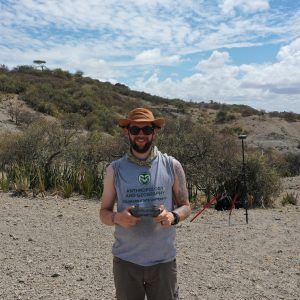Alex Pelissero
Summer 2024

Winning Awards and Droning to Study Early Humans
Can drones help anthropologists look back in time to understand early humans’ migrations and encounters?
Doctoral candidate Alex Pelissero is using drone technology to map sites of early human interactions at Olduvai Gorge in Tanzania — and earning research support for his novel, tech-driven project. Pelissero has won fieldwork dissertation and research grants from both the Leakey Foundation ($17,000) and the National Science Foundation ($8,000) in 2024 to return to Tanzania and continue mapping begun in 2023. Pelissero works in the field with advisor Professor Michael Pante, fellow doctoral student Tewabe Negash Kessaw, and colleagues in Tanzania. Pelissero also previously won funding through the department’s Anthropology Scholarship Endowment in 2022 and 2023 to help launch his research.
“My endowment scholarship helped pay for both my FAA drone license classes and my 2023 fieldwork drone mapping at Olduvai Gorge, Tanzania,” Pelissero said. “This pilot study was foundational for my dissertation research mapping the archaeology of early humans at the site, and its success was due in no small part to the funds I received from the endowment.”
New Technology, Ancient Maps
Olduvai is one of the most renowned and important areas for paleoanthropological discovery and furthering understanding of early human evolution and coexistence. Louis and Mary Leakey excavated in the area from the 1950s-’70s, and found fossils and evidence of several early human species dating back 1.2-1.9 million years ago.
Pelissero’s project, “The distribution of hominin activities at Olduvai Gorge: A geospatial approach” has used drones to conduct a large aerial survey of Olduvai. Ultimately, the research will map the vast majority of the gorge — widely expanding areas where paleoanthropologists have images and data. Pelissero will use the images to create a high-resolution site model, which then be used to map the patterns of early human activities from roughly 1-2 million years ago, and how they changed during that time.